 
|
||||
|
|
DELAY TACTICS |
|||
|
Although there is a sonic connection to the mix of guitar noir, New Age instrumentals and hip-hop beats on Elements Of Surprise and on Carl Weingarten’s recent solo albums, more so than on David Udell’s 2015 pop-rock album, this Delay Tactics comeback album stands on its own ground as a testament to the music that Walter, David and Carl conjure as a creative team. More than just a sonic flashback to the 1980's, Elements Of Surprise is a step forward from the progressive instrumental sound that Delay Tactics pioneered all those years ago. Released on CD and digital in the Fall of 2022, Elements Of Surprise drives the Delay Tactics sound into the 2020’s with a reinvented musical significance. There was a vinyl LP anthology of early 1980s Delay Tactics works released in the U.K. on the Emotional Rescue label but, as far as this 2022 reunion album goes, Elements Of Surprise fulfills the promise of the Delay Tactics reunion that David Udell spoke about in his 2015 interview on mwe3.com featuring him discussing his then album Orchids.
Even considering the expansive guitar-centric vision of Carl Weingarten’s recent albums, and the pop-rock vision of David Udell’s recent release, the sound of Elements Of Surprise stands much of today's music orthodoxy on its head. During the summer of 2022, Delay Tactics released the first track from the reunited band. The lead-off track on Elements Of Surprise, “Viola’s Ascent” is a stunning example of the renewed Delay Tactics approach. With the interlocking guitars of David Udell and Carl Weingarten weaving between Walter Whitney’s rhythmic synths, guitars and keys, the sound of Elements Of Surprise is complete with the addition of Michael Manring on fretless electric bass. Manring has worked over the years with Carl Weingarten and he fits in perfectly on Elements Of Surprise adding a cavernous bottom to the Delay Tactics sound. A good example of where Elements Of Surprise synchronizes perfectly is track 3, “Shadow Of Berlin”. Created in the style of mid 1980s Tangerine Dream, this astonishing track sizzles as both a Euro-style dance track and an ambient spy-jazz jam, while the album’s lead-off track “Viola’s Ascent” breaks new ground in the atmospheric / progressive music world. With its futuristic sound from another dimension, hitherto unexplored by any band currently releasing music, “Viola’s Ascent” is a remarkable sonic achievement. Other elements, so to speak, in play here include retro flavored music in the spirit of 1960s experimentalists such as synth pioneers Gerhson Kingsley, guitar icon Robert Fripp, with further subliminal sonic directives from Les Paul and Martin Denny, as well as other exotica and electronica legends. With Elements Of Surprise, Delay Tactics steps back onto the world stage with a masterpiece album rife with fascinating, innovative music filled with immense sonic consequences.
mwe3.com presents a new interview with
Carl: I always wanted us to finish a third album. We did start on a third project in 1986, after Any Questions? was released, but never finished it. Fast forward to 2016 and the UK label Emotional Rescue approached me to release a vinyl compilation of Delay Tactics called Imperfect Strangers. David, Walt and I were all involved, going over all the material we had, and it got us thinking about recording again. Walter: It was just time to do it. Kind of “It’s now or never” to quote Elvis. David: Yes, going over the old material got us excited. We wanted to finish and release those. The funny thing is, we got so excited we came up with mostly new material.
Carl: We started recording in 2016, and I think the first track was “Viola’s Ascent”, which David composed and then sent Walt and I the percussion and string parts to develop. We tried file swapping through email and then We-transfer but it quickly became an organizational nightmare. “Who has the master files?” “Is this the latest mix?” “Where did my parts go?” So I set up a server account for all of us to drop in new tracks, retrieve files and exchange mixes. We also met on Zoom every week to review each song and what needed to be done. Walter: Like Carl said, we needed to get organized. We had folders on the server for songs in progress, MP3 reference mixes, another for WAV files submitted for the final mixes selection process etc. When we uploaded a part we identified it with a date and put it in the right song folder. It worked really well. David: There are no rules about what instrument each of us might play. Sometimes a piece might call for something that one of us is stronger at, so we might push that. The drums are real. I took several audio clips and chopped them up into new parts. Working separately was confusing at first, until we started using the server. We’d work for hours and the next person wouldn’t see it before adding their own parts. We actually lost a lot of work that way which added to the time it took to complete the project.
Carl: We agreed to have equal say and equal credit on all the songs, no matter who wrote the original parts, or who played what or how much on any given track. A goal of this project was to aim for the same vibe we had on the first two albums. I think we got there, despite the years between and the quantum leap in music technology. Out-Pop Options was recorded on a 4-track and Any Questions? on an 8-track. Even after all this time, Elements Of Surprise still sounds like Delay Tactics. If I had to name one tune that would mix with those earlier recordings it would be “Don’t Wake The Pharaoh”. Walt’s synthesizer arrangements have always had their own unique sound. His DNA is all over this song.
David: The younger me would have been amazed by the affordability of the technology. If we’d had it then, we would’ve been dangerous. The DT sound is and always has been a perfect melding of our individual tastes. Each of us has an individual sound we’ve been honing for decades. If you listen to our solo stuff you’ll hear it. As far as looking ahead 40 years, that’s always been our intention. Another way to look at it; we want to be able to look back 40 years and say it still works. mwe3: Is there a cool story on “Viola’s Ascent” and why did you pick that track as the single from the Elements Of Surprise album? The track has got a remarkable ascending sound to it. Is “Viola’s Ascent” a kind of “prelude” or introduction to the album of sorts? Who is Viola and how does the Ascent part fit in to the title and song? You describe it as “pop ambient” but I think the track has much too going on for just a simple description. Carl: “Viola” is David’s composition, and as I mentioned before, he sent Walt and I the initial arrangement. We loved it. We all added parts immediately, and then it was on to the other tunes. But last year David decided he didn’t like the arrangement, and we went back and forth about what to do since Walt and I really liked the original mix. David wanted to slow down the pace of the song and let there be more space between the guitar and keyboard solos. Walter: I could make up a dramatic story about Viola and her struggles with life and romance and the loss of her horse “Fabulous Frederica” in a barn fire, but it would just be for fun. LOL David: Cello is in love with Viola and she said yes! The chord progression is something I did around 1980 with my Prog band Wax Theatricks. It’s the middle section of a song called “This City”. I played it on piano and our sax player soloed over it. In Viola, the flutes are that chord progression. Then played again using an arpeggiator with cello samples.
Carl: Bass is such a fundamental and core sound for any band, and though David has played bass on a few songs, we really wanted a specialist who would act as a fourth member. The first two albums had our friend bassist Jim Mayer. He’s a long time member of Jimmy Buffet’s band. Jim is a very technical player, and very much in a jazz and pop tradition, but he was open to experimenting, which was perfect for us. Michael was perfect for the same reasons, brilliant, technical, imaginative and experimental. Walter: I cannot possibly say enough great things about Michael and his musicianship. I am extremely happy that he agreed to play on our CD. Carl’s networking on the left coast made that possible. David: In the 1980’s we worked with Jim Mayer on bass. Carl has always found excellent bassists. Our music has always called for fretless. I have to give a shout out to Walt for his great bass playing on “Kalimba Lounge” though. mwe3: “Kalimba Lounge” is another pastoral sounding track. It almost has a tropical vibe to it. I was thinking that it sounded Hawaiian. I know the kalimba is an African instrument. Is there an actual kalimba on that track? Tell us about Walter’s synth solo on that track. I like the way it takes off into the stratosphere. I call it “Prog-exotica”.
Walter: I remember making this basic track several years ago with the drum machine, kalimba and bass parts. I’m pretty sure I played the kalimba with a stick to get a more percussive and different sound. When we started again on it this year my synth parts were inspired by what Carl and David added first, then when it started taking shape what I needed to do became more clear. David: That is a kalimba and it’s one of Walt’s pieces. His track inspired my nylon string part. mwe3: I was reading the back cover of the Elements Of Surprise CD package with the original quote from journalist JD Considine from the mid 1980s. Wow, that’s going back a long ways! I was reading that WNYC was playing Delay Tactics back in the day. It seems like college radio was more open to progressive instrumental music 40 years ago than they are today. It seems like NPR pays less attention to new music in 2022 than they did in 1982. Carl: NPR has its priorities, and music isn’t one of them at the moment. There’s All Songs Considered, which is very popular, but it’s primarily an internet production rather than a broadcast feature. And, I have to say, I don’t know how many times I’ve tuned in to hear an artist I’ve never heard of, profiled, where the interviewer is going on about how amazing he/she is, only to be revealed at the conclusion that so and so’s “debut album releases next week”. So, it’s not about discovery, it’s about management. On the other hand, local radio across the country, has always been our best friend. There are hundreds of station-produced music shows across the country, with DJs that carry the banner for independent music.
David: Delay Tactics and Wax Theatricks both got a push from NPR in the ‘80s. Especially local radio. mwe3: As great as “Viola’s Ascent” is, I really enjoyed track 3 “Shadow Of Berlin”. It does have a dark, magisterial, Teutonic flair to it. How did that track fit into the Elements Of Surprise protocol? Was it inspired by German synth bands like Tangerine Dream or other Euro artists? Are the guitars intertwining? Walter’s electric piano almost gives the track a sense of humor missing from much synth music. Is that track an anomaly or would Delay Tactics consider doing more music like that? It’s almost dance music and surely there’s a drummer on “Shadow Of Berlin”? Carl: I’ve been a fan of Tangerine Dream since I was in high school, and “Shadow Of Berlin” is definitely a nod. I actually wanted the song to have more of that Berlin sequence-up-front sound, but David and Walt would have none of that. They immediately took the song in a different direction, which inspired me more, and with David’s lead guitar parts, to go even further into rock territory. Walter: I love German synth music and Euro techno. I would be up for Delay Tactics doing an entire CD with 4 in the floor kick drum action, Sequencers, and some glitchy vocal parts. But we would have to add solos which is sort of not faithful to the genre. But what’s wrong with that? David: I put the drums together on that. It was too Tangerine Dream for Walt and me. Don’t get me wrong, we all love them. It also gave me a chance to play wah lead and I’ll always jump at that.
Carl: “Pharaoh” is a great track and mostly a David and Walter production. But I thought it needed an ending, and I couldn’t stand the idea of a fade-out. So just as the song is winding down, I added a guitar solo, a micro-tonal slide thing with a Middle Eastern tone. It emerges from the background to finish out the tune, like the Pharaoh is waking up. Walter: I started this one a few years ago and never knew what to do with it. It begins with a simple idea and takes off into a classic “build it into something as it goes” composition. And really gets into an almost ambient trek into the distance ending. I really love how this one ends. It’s like writing a good story, not only is the plot important but how it resolves is even more so. The ending is the last thing you hear and the most you will remember if it’s done well. I love what Carl did on the ending solo. Oh and don’t forget the little vocoder part! David: I played the guitar chord progressions with wah and flanger. Did the heavily delayed bass synth too but most of it was Walt. mwe3: “Fire Ceremony” starts off with an eerie chord sequence. It reminded me a bit of the rock band YES but I don’t remember them using a shimmering keyboard sound like that. Tell us about the keyboard sound on that track and about the guitar solo in the intro and there’s also a Spanish guitar to help humanize the sound which is fascinating to say the least. Is that yet another track on Elements Of Surprise that is very hard to pigeonhole? Being without a defined beat would you describe “Fire Ceremony” as amorphous sounding... kind of like a “Fire Ceremony” itself? Carl: We like to challenge each other creatively. Each new piece is an opportunity to do something different. This is one that Walt initiated, and he wanted me to revive an old guitar tone he called my “Radio Guitar”, which I used on our first two albums on songs “Basic Tactic” and “Hands On Fire”. It combines a ring modulator with a rat fuzz. Or, as an old girlfriend once referred to it sounding, “like my dad’s electric shaver.”
David: I played the nylon string acoustic. The piece felt somber to me and it was inspiring. One of my favorites. There’s a short nod to John McLaughlin. mwe3: “Ever Unwinding” has another kind of nebulous sounding structure to it. Is that David’s guitar in the beginning? How many guitars are on that track and what keyboards are featured on “Ever Unwinding”? I also hear slide guitar too. Tell us about the video that was created for that track. Carl: “Ever Unwinding” has a very slow tempo, and there’s a modal feel to it. I thought the changes that David wrote should be more dramatic, so I added a slide part to add some atmosphere and emphasize the progression. Walter: I played the Wurlitzer piano patch and the synth solo where the tempo picks up. Also, a couple of minimoog synth sweep bass parts in stereo. Another what I would call a lazy, Sunday afternoon relaxation piece!
mwe3: “Idea3” sounds like a kind of spacey jam session. What is the concept of “Idea3” and/or did you want to include a more free form funk/fusion jam type track to Elements Of Surprise? It almost sounds like a kind of interlude of sorts. It also sounds like there’s a kalimba on that track as well. Carl: We swapped hats on “Idea3”. I recorded the abstract rising effects, while Walter played the lead guitar and David produced the percussion and synthesizer tracks. David: When we first started recording, I presented them with skeletons for “Viola”, “Ever Unwinding”, and one I just called “Idea3”. That name stuck. I started with programmed drum and noise bursts, an arpeggiated electric piano, and synths. I thought it was a total throwaway. They gave it to Manring and it just exploded. It really shows the possibilities of collaboration. I love the ascending synth that resolves at the end. mwe3: “Acoustic Reprise” is another track that sounds a bit different from the more up-tempo tracks on Elements Of Surprise. Is it a kind of neoclassical or a New Age sort of track. It does have a great synchronicity to the overall arc of the track and in a way it moves like musical clockwork. Is there a mellotron on “Acoustic Reprise” during the final couple minutes? It does evoke a dreamy, prog-like atmosphere.
Walter: I added acoustic piano on the first and second go round then, yes a mellotron flute at the end. David: Yeah, I saw stacks of new repeating parts that grew from the previous ones. Kind of growing and bifurcating. That’s not how it turned out, but hey! mwe3: “Three Voices” closes the Elements Of Surprise album. Did you want to close the album with an amorphous sounding track say compared with the aggressive interplay of “Shadow Of Berlin”? Can you tell us who is playing what on “Three Voices”?
Walter: I will have to say that the use of a couple of older uncompleted tracks contributed to our sound being consistent with the first two albums. David: I loved this piece from the moment I heard it. Carl’s lead just weeps. I knew what it needed was an acoustic arrangement he could play against. Usually, you’d play lead to an existing arrangement. This was totally backwards. mwe3: I was glad to see you included the mwe3.com review of Out-Pop Options and Any Questions? On the DelayTactics.com website, all the way back to January 2001! Wow, that seems like an eternity ago, almost a year before 9/11. Here’s the direct link if you can fix it so the readers don’t have to scroll. This was right around the time I first started the website and I’m happy that I was able to review it, even a small review, I must have also featured it in 20th Century Guitar magazine too at the time.
David: What Carl said. mwe3: Can you tell us about your other current musical activities and what else you and Delay Tactics have planned at this time? Carl’s albums are still in high rotation and gaining traction, and I remember writing about David’s album Orchids from 2015, which just seven years ago seems like a lifetime ago. I guess we’ve aged a lot in the past seven years! What’s next for you in the music world? Carl: Emotional Rescue issued a compilation LP, Imperfect Strangers in 2020, but it’s only half the songs of the two albums, and they didn’t want to include any previously unreleased recordings, which includes some of our best work, actually. So we’ve got plans to do a complete reissue as a box set next year that would include all three albums, plus the unreleased tracks from each project and a live concert recording as well. Walter: We have discussed doing some singles in the next few months and 2023 without the pressure of biting off an entire CDs worth of material and releasing none of it until the whole thing isdone. As for me, I have two projects nearing completion: 1) A cassette tape with experimental tracks named “Espionage” using every trick in the book that I have learned over the years. Lots of David: I'm putting the finishing touches on my next record It's Worth It. I'm also well into its follow up Theater Of The Mind.
|
|
|||
|
||||

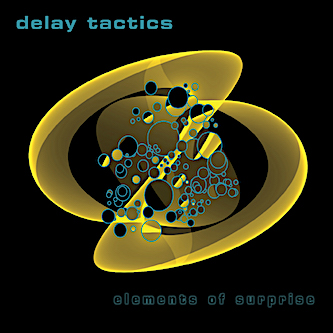 Released in the summer of 2022, Elements Of Surprise is the much awaited reunion album by the early 1980s progressive / contemporary instrumental synth-pop band, Delay Tactics. The title Elements Of Surprise is a kind of understatement as the reunited band, consisting of Carl Weingarten (guitars, slide guitar), David Udell (keyboards, guitars) and Walter Whitney (synthesizers, guitars, piano) appear in peak form, sounding like they haven’t missed a sonic step in the past 40 years. Carl Weingarten’s recent solo albums, Stop Me Try (2022) and Ember Days (2021) further enhanced his reputation in the contemporary guitar instrumental world and, for those lucky enough to have heard it, David Udell’s pop-rock vocal album release from 2015, Orchids is a modern-day Americana masterpiece. For a taste of Walter Whitney’s solo music check out his 1983 album on Multiphase, Composer X, that was recently reissued in Japan and Walter and Carl's album from the same period, Dreaming In Colors. Walter's Bandcamp page is also quite extensive and impressive. Taking into account each of their individual reputations as first rate musicians / composers, the 2022 Delay Tactics comeback is very much a shared venture with the music composed and performed by all three of these acclaimed musicians.
Released in the summer of 2022, Elements Of Surprise is the much awaited reunion album by the early 1980s progressive / contemporary instrumental synth-pop band, Delay Tactics. The title Elements Of Surprise is a kind of understatement as the reunited band, consisting of Carl Weingarten (guitars, slide guitar), David Udell (keyboards, guitars) and Walter Whitney (synthesizers, guitars, piano) appear in peak form, sounding like they haven’t missed a sonic step in the past 40 years. Carl Weingarten’s recent solo albums, Stop Me Try (2022) and Ember Days (2021) further enhanced his reputation in the contemporary guitar instrumental world and, for those lucky enough to have heard it, David Udell’s pop-rock vocal album release from 2015, Orchids is a modern-day Americana masterpiece. For a taste of Walter Whitney’s solo music check out his 1983 album on Multiphase, Composer X, that was recently reissued in Japan and Walter and Carl's album from the same period, Dreaming In Colors. Walter's Bandcamp page is also quite extensive and impressive. Taking into account each of their individual reputations as first rate musicians / composers, the 2022 Delay Tactics comeback is very much a shared venture with the music composed and performed by all three of these acclaimed musicians. 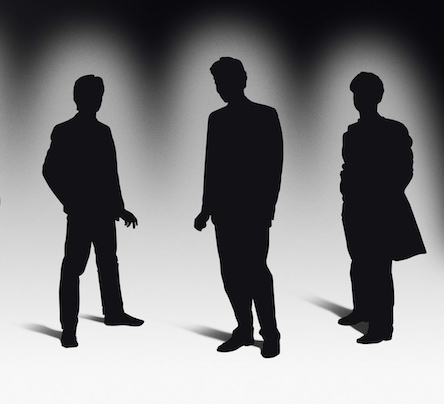 Looking back to the early and mid 1980s, music critics were mentioning Delay Tactics in the same breath as the influential sounds of synth-pop pioneer Brian Eno, guitarist Bill Nelson and even minimalist classical composer Philip Glass. Right from the start, prog-rock music fans and critics were captivated by the first two Delay Tactics albums, with writers praising the group’s experimental and instrumental synth-pop sound which combined all sorts of guitar strategies and keyboards washes, overflowing with tape loops, loads of reverb and all kinds of sonics.
Looking back to the early and mid 1980s, music critics were mentioning Delay Tactics in the same breath as the influential sounds of synth-pop pioneer Brian Eno, guitarist Bill Nelson and even minimalist classical composer Philip Glass. Right from the start, prog-rock music fans and critics were captivated by the first two Delay Tactics albums, with writers praising the group’s experimental and instrumental synth-pop sound which combined all sorts of guitar strategies and keyboards washes, overflowing with tape loops, loads of reverb and all kinds of sonics.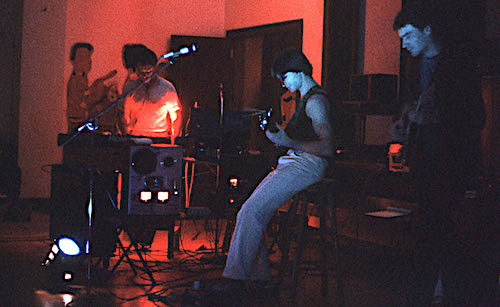 mwe3: It’s been quite a long time since the first two and only two Delay Tactics albums came out in the early 1980s. What was the driving impetus for this Delay Tactics comeback and the release of Elements Of Surprise that just came out on CD in September 2022?
mwe3: It’s been quite a long time since the first two and only two Delay Tactics albums came out in the early 1980s. What was the driving impetus for this Delay Tactics comeback and the release of Elements Of Surprise that just came out on CD in September 2022?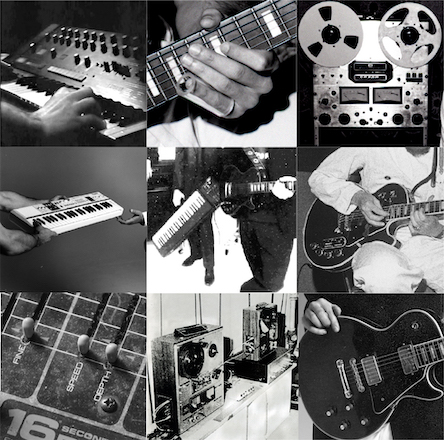 mwe3: How and when was the music on Elements Of Surprise written and recorded? There must have been quite a few sound files going back and forth on the internet. I find it amazing that all three members add in guitars and, as such, it’s almost impossible to know who is adding in a solo at any one given time! Were there any complications recording without a drummer, although I realize there is “automated percussion” on Elements Of Surprise, so there is a sense of drumming and even urgent percussion throughout the album.
mwe3: How and when was the music on Elements Of Surprise written and recorded? There must have been quite a few sound files going back and forth on the internet. I find it amazing that all three members add in guitars and, as such, it’s almost impossible to know who is adding in a solo at any one given time! Were there any complications recording without a drummer, although I realize there is “automated percussion” on Elements Of Surprise, so there is a sense of drumming and even urgent percussion throughout the album. 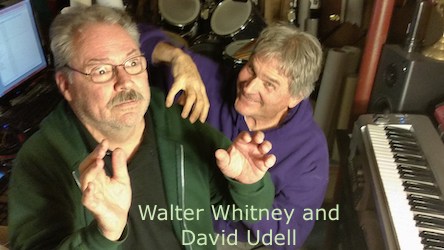 mwe3: What tracks on Elements Of Surprise do you feel most hark back to the original Delay Tactics intent and sound or is this a new sound altogether? It definitely sounds matured compared to the early 1980s sound. If you could go back 40 years ago with a copy of Elements Of Surprise would the younger you be amazed or shocked at what was to come 40 years later?
mwe3: What tracks on Elements Of Surprise do you feel most hark back to the original Delay Tactics intent and sound or is this a new sound altogether? It definitely sounds matured compared to the early 1980s sound. If you could go back 40 years ago with a copy of Elements Of Surprise would the younger you be amazed or shocked at what was to come 40 years later?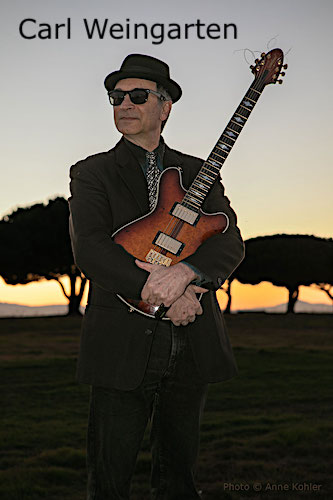 Walter: It was a natural process for me, it was just like we started where we left off without any conscious effort to sound like we did. I think the music says it all and has the vibe that we were just doing what we wanted to hear when we get together. I think the song “Idea 3” is most reminiscent of the “Any Questions” LP where David has the same exact slap echo on his guitar.
Walter: It was a natural process for me, it was just like we started where we left off without any conscious effort to sound like we did. I think the music says it all and has the vibe that we were just doing what we wanted to hear when we get together. I think the song “Idea 3” is most reminiscent of the “Any Questions” LP where David has the same exact slap echo on his guitar. mwe3: Tell us about bringing Michael Manring’s fretless bass into the new Delay Tactics album. Carl has worked with Michael quite a bit over the years so how did Michael blend his fretless bass in with the new Delay Tactics album?
mwe3: Tell us about bringing Michael Manring’s fretless bass into the new Delay Tactics album. Carl has worked with Michael quite a bit over the years so how did Michael blend his fretless bass in with the new Delay Tactics album?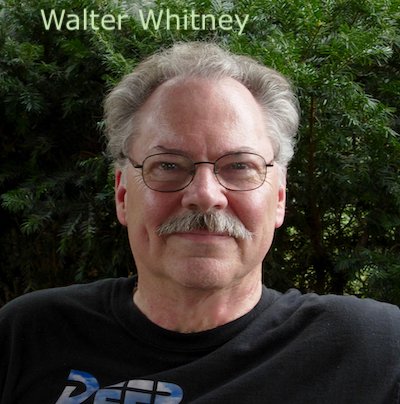 Carl: I can’t speak for Walt, but when he sent me the percussion and kalimba parts a few years back I set it aside. And I think we both forgot about it. I ran across the tracks as we were mixing the album, only this time, it jumped out at me. It has a great, vintage clunky sound. We had to finish it.
Carl: I can’t speak for Walt, but when he sent me the percussion and kalimba parts a few years back I set it aside. And I think we both forgot about it. I ran across the tracks as we were mixing the album, only this time, it jumped out at me. It has a great, vintage clunky sound. We had to finish it.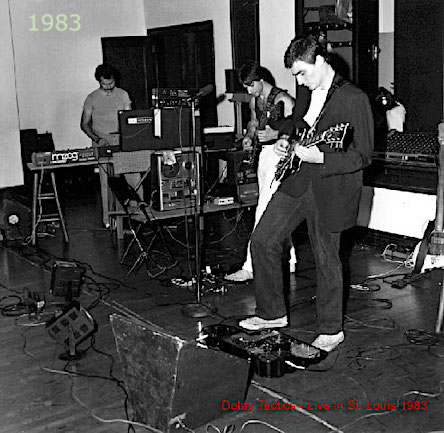 Walter: I will agree that NPR has been a disappointment as regards its consideration of the arts these last few years.
Walter: I will agree that NPR has been a disappointment as regards its consideration of the arts these last few years.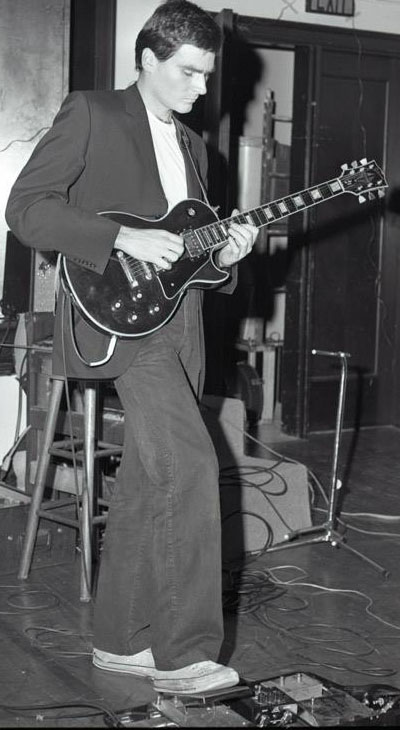 mwe3: “Don’t Wake The Pharoah” is an interesting title for track four on Elements Of Surprise. It’s hard to deduce an influence on that track let alone try to figure out what style of music it evokes! It’s prog in a way but it also has a funk and jazz edge, especially the piano keyboard which seems to add in a moog-like sound to it. Who is playing what on that track? It’s sort of like prog-funk if you don’t mind the sonic juxtaposition.
mwe3: “Don’t Wake The Pharoah” is an interesting title for track four on Elements Of Surprise. It’s hard to deduce an influence on that track let alone try to figure out what style of music it evokes! It’s prog in a way but it also has a funk and jazz edge, especially the piano keyboard which seems to add in a moog-like sound to it. Who is playing what on that track? It’s sort of like prog-funk if you don’t mind the sonic juxtaposition.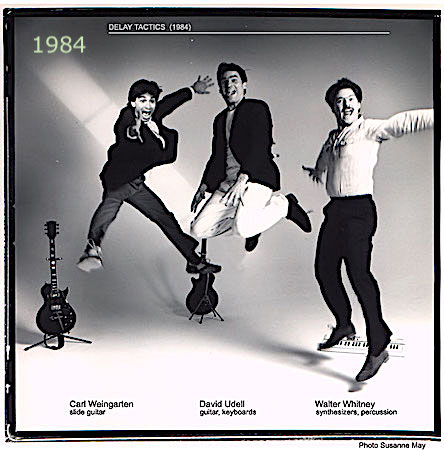 Walter: I made a chord progression loop on an old midi sequencer and faded in the two main backing chordal parts in the mix. A synth piano-esque sound and the shimmering synth. I had been experimenting with asynchronous rhythm tracks that are conglomerations of percussion sounds that are gated and processed into an exotic uncommon sound. I think it worked in this piece! And I am happy with the way the tune fades out with the piano-esque track.
Walter: I made a chord progression loop on an old midi sequencer and faded in the two main backing chordal parts in the mix. A synth piano-esque sound and the shimmering synth. I had been experimenting with asynchronous rhythm tracks that are conglomerations of percussion sounds that are gated and processed into an exotic uncommon sound. I think it worked in this piece! And I am happy with the way the tune fades out with the piano-esque track.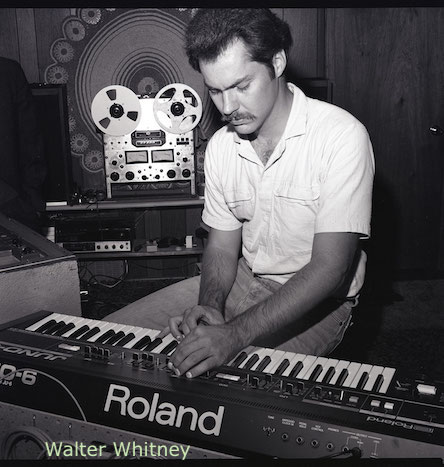 David: Slides are all Carl. I put together drums, bass, arpeggiated synths and strings. I also played a very lazy lead solo that interacted with Walt’s electric piano. I was totally in the moment and wanted no flash. I put together the video with slow motion-reverse colored inks in water, and smoke. A lot of green screen. A bit over the top perhaps.
David: Slides are all Carl. I put together drums, bass, arpeggiated synths and strings. I also played a very lazy lead solo that interacted with Walt’s electric piano. I was totally in the moment and wanted no flash. I put together the video with slow motion-reverse colored inks in water, and smoke. A lot of green screen. A bit over the top perhaps.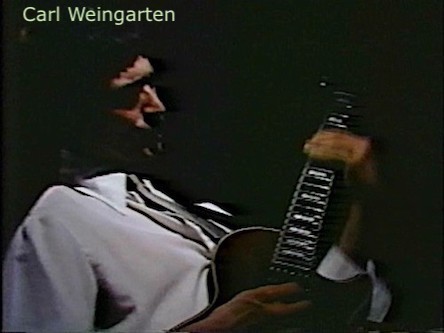 Carl: The first guitar you hear is a part that David played for another song. I thought it was a beautiful melody, so I sampled it as a seed to begin a completely new piece. I was shooting for a classical chamber music piece, where each part would be distinct and harmonize on the melody line, then adding new parts each time the melody came around. Again, the guys would have none of that, almost, but expanded on the original concept with both acoustic guitars and keyboard sounds.
Carl: The first guitar you hear is a part that David played for another song. I thought it was a beautiful melody, so I sampled it as a seed to begin a completely new piece. I was shooting for a classical chamber music piece, where each part would be distinct and harmonize on the melody line, then adding new parts each time the melody came around. Again, the guys would have none of that, almost, but expanded on the original concept with both acoustic guitars and keyboard sounds.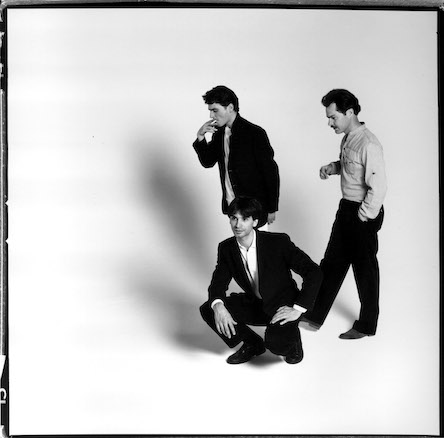 Carl: “Three Voices” was actually a track from a longer piece called “The Blinding Sea” which had been intended for a project Walt and I had started as a follow up to Dreaming In Colors. After a few songs it got set aside and became yet another unfinished project. When we first started work on Elements Of Surprise I was sending the guys tracks we already had, just to spark some ideas and get a feel for where we might be heading. David heard the track and wanted to contribute and bring it into Delay Tactics.
Carl: “Three Voices” was actually a track from a longer piece called “The Blinding Sea” which had been intended for a project Walt and I had started as a follow up to Dreaming In Colors. After a few songs it got set aside and became yet another unfinished project. When we first started work on Elements Of Surprise I was sending the guys tracks we already had, just to spark some ideas and get a feel for where we might be heading. David heard the track and wanted to contribute and bring it into Delay Tactics.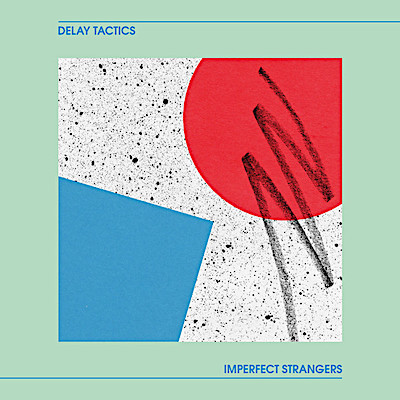 Carl: That’s right, that’s back when we did a short run reissues of the first two albums.
Carl: That’s right, that’s back when we did a short run reissues of the first two albums.